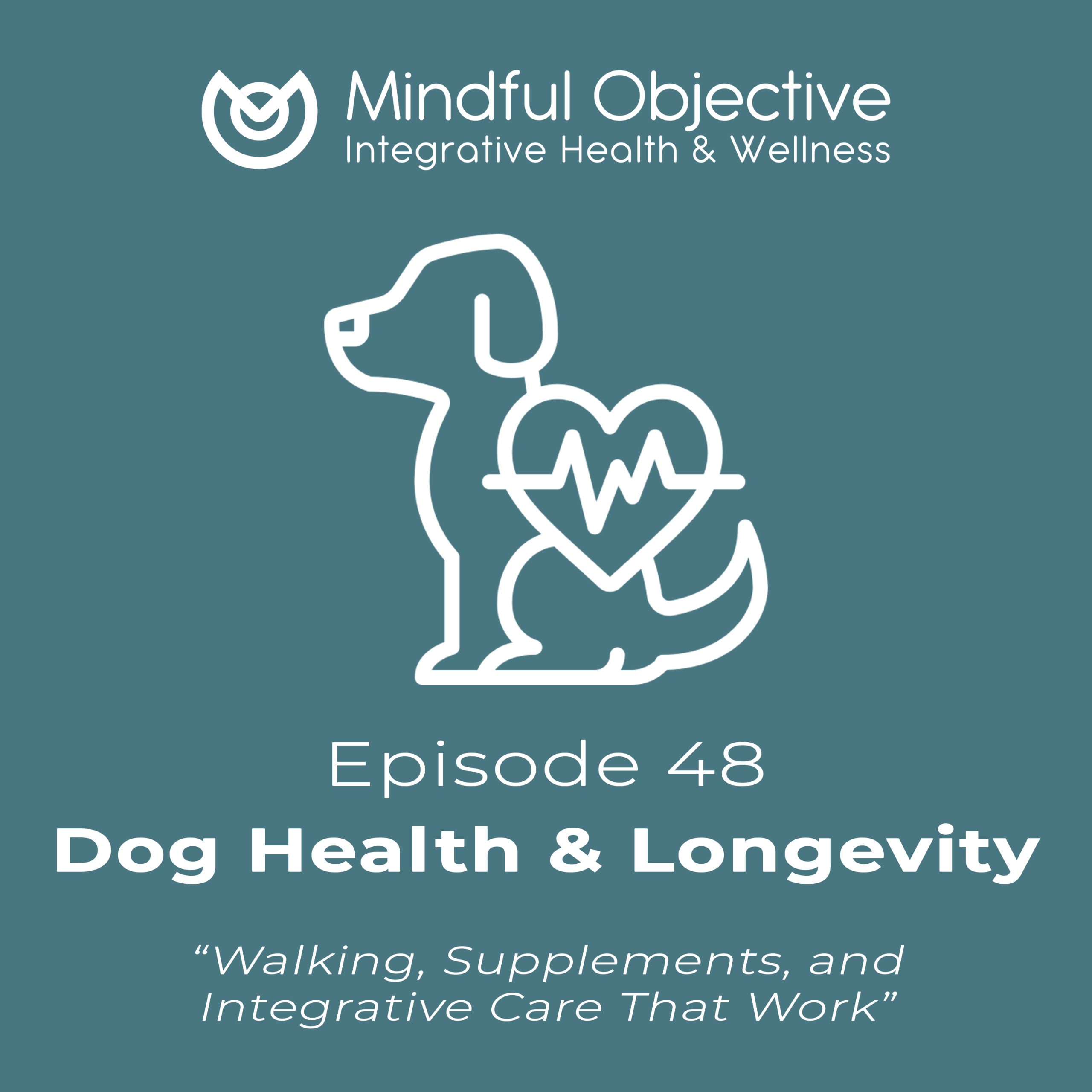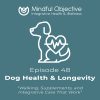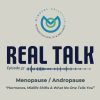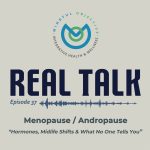
- 0 Comments
- Mindful Objective
Dog Health & Longevity: Walking, Supplements, and Integrative Care That Work
Why Dogs Deserve Integrative Care Too
Dog health supplements and integrative care strategies can add years to your dog’s life. Dogs aren’t just pets — they’re family. They share our homes, our routines, and even our emotions. And just like us, they need consistent care to stay healthy as they age.
The challenge is that most of us don’t think about our dog’s health until a problem shows up — maybe stiff joints, itchy skin, or less energy than they used to have. But by then, it’s often harder to manage.
That’s why taking an integrative approach matters. By combining daily movement, balanced nutrition, targeted support, and even conventional tools when needed, we can help our dogs thrive for years to come.
In this blog, we’ll touch on walking, supplements, allergies, and nutrition. And for the full conversation — including personal stories, examples, and strategies I use with my own dog Jack — be sure to listen to Episode 48 of the Mindful Objective Podcast.
Walking: The Simplest Medicine for Dogs
Walking may be the single most effective thing you can do for your dog’s health — and it costs nothing.
Daily walks:
-
Keep joints lubricated and flexible
-
Help regulate weight, reducing strain on hips and knees
-
Stimulate digestion and circulation
-
Reduce anxiety and destructive behavior
-
Strengthen the bond between you and your dog
For younger dogs, walks can be long and challenging. For older dogs, short but consistent outings may be best. The point isn’t to hit a perfect number of steps — it’s to make walking a daily rhythm.
In the podcast, I share how my own dog Jack sometimes benefits more from several shorter walks rather than one long one, especially in hot weather. It’s all about adapting movement to your dog’s needs.
Joint Health: Supporting Mobility from the Inside Out
Dog health supplements, such as joint health is one of the most common concerns for dogs, especially as they age. If you’ve seen your dog limp, hesitate to climb stairs, or struggle to get up, you know how hard it is to watch.
Movement is key, but it’s not always enough. Dogs often need extra support as cartilage wears down and inflammation increases. This is where supplements and integrative strategies come in.
In the episode, I talk about the building blocks that can make a difference — things like glucosamine, MSM, and natural anti-inflammatory compounds. I also share how these helped Jack stay more mobile and active over the years.
But here’s the reality: sometimes natural options don’t fully solve the problem. That’s when integrative care matters most. In Jack’s case, severe allergies once left his paws raw and swollen. After trying natural approaches without relief, a single Cytopoint injection was enough to give him weeks of comfort.
The lesson? We don’t have to choose between natural and conventional care. The best outcomes often come from blending both.
Whole-Body Support: Looking Beyond the Joints
When we think about dog health, joints get most of the attention. But just like humans, dogs rely on multiple systems working together — liver, immune function, digestion, and brain health all play a role in longevity.
As dogs age, their bodies face more stressors. Medications, environmental toxins, and changes in metabolism can all affect how they feel. Supporting the whole body, not just one system, is key to keeping them resilient.
In Episode 48, I walk through what whole-body support looks like in practice — from liver health for dogs on long-term medications, to nutritional strategies that protect their immune system, to the role of hydration and fresh food.
The takeaway? Don’t just wait for problems to appear. Think proactively about all the systems your dog relies on.
Nutrition: The Foundation of Canine Health
No supplement can replace good nutrition. Food is the foundation of your dog’s health, and it has a direct effect on their energy, skin, coat, and digestion.
One strategy I use with Jack is rotating food brands every month. Instead of feeding the same kibble year-round, I rotate between options like Red Barn, Honest Kitchen, Open Farm, and American Journey. These are usually grain-free and limited-ingredient formulas.
Rotating foods helps in a few ways:
-
Reduces the risk of food sensitivities
-
Provides a wider variety of nutrients
-
Supports a stronger gut microbiome
-
Keeps meals interesting for your dog
In the podcast, I explain how food rotation has supported Jack’s digestion and immune balance. I also touch on how adding small amounts of fresh foods — pumpkin, blueberries, bone broth — can give an extra boost.
Nutrition is love in action. Every time you fill your dog’s bowl, you’re shaping their health for the future.
Allergies: When Natural Isn’t Enough
This is one of the toughest areas for pet owners. Allergies in dogs can show up as constant itching, ear infections, or chewed-up paws. And it’s hard to watch because you know they’re suffering.
Jack has seasonal allergies that sometimes flare so badly that his feet become raw. We’ve tried natural approaches — probiotics, omega-3s, rotation diets — and while they help, sometimes it’s not enough.
That’s when we’ve used a Cytopoint injection. One dose gives him weeks of relief, allowing his body to heal and his quality of life to return.
The important lesson here is that integrative care isn’t about rejecting one approach. It’s about choosing the best tool for the moment. Most of the time, nutrition and supplements carry the load. But sometimes conventional medicine is the difference between misery and comfort.
Practical Strategies for Every Dog Owner
So, what can you do starting today? Here are a few simple, practical steps:
-
Walk your dog daily — even short walks matter.
-
Rotate food regularly — and consider adding fresh foods for variety.
-
Think ahead about joint health — start support before major issues arise.
-
Support the whole body — liver, digestion, and immunity matter too.
-
Be flexible with care — combine natural and conventional approaches when needed.
-
Stay connected — love, presence, and routine are just as healing as anything in a bottle.
If you want the deeper dive — with stories, examples, and more detail — listen to Episode 48 of the Mindful Objective Podcast. It’s where I share how I put these strategies into practice with Jack and why they matter so much for the dogs we love.
Final Thoughts
Dogs give us unconditional love. They’re with us through good days and bad, asking for so little in return. Supporting their health is one of the greatest gifts we can give back.
By focusing on movement, nutrition, targeted support, and integrative strategies, we can help them live longer, more joyful lives.
For more on this topic — and a practical, real-world look at how to put it into action — check out Episode 48 of the Mindful Objective Podcast.
Disclaimer
This blog is for educational purposes only. It is not intended to diagnose, treat, cure, or prevent any disease. Always consult with your licensed veterinarian before starting your pet on any new diet, supplement, or medication.
Now streaming on all major platforms.
Useful Links to Get Started
If you’re ready to take control of your hormone health, we’ve got three key resources for you:
Discount Self-Service Labs
Get high-quality, pre-built hormone panels you can order yourself. No doctor visit required.
https://discounttrtlabs.com
Work with an Integrative Health Practitioner
Explore our foundational protocols, personalized plans, and root-cause approach to men’s health.
https://mindfulobjective.com
Professional-Grade Supplements (20% Off Retail)
Access practitioner-selected supplements delivered to your door at a discount.
https://us.fullscript.com/welcome/mindfulobjective/store-start





